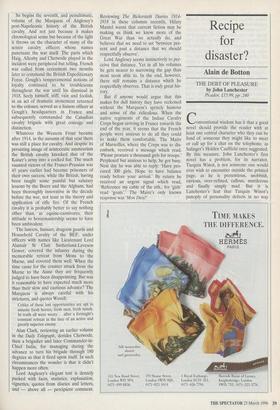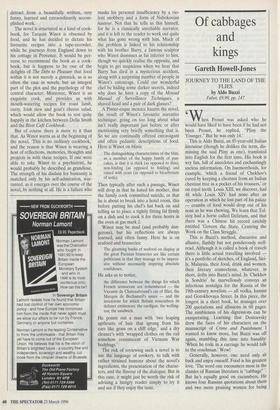Recipe for disaster?
Main de Botton
THE DEBT OF PLEASURE by John Lanchester Picador, £15.99, pp .240 Conventional wisdom has it that a good novel should provide the reader with at least one central character who they can be fond of, someone they might like to meet or call up for a chat on the telephone, as Salinger's Holden Caulfield once suggested. By this measure, John Lanchester's first novel has a problem, for its narrator, Tarquin Winot, is not someone one would ever wish to encounter outside the printed page, as he is pretentious, snobbish, envious, over-refined, callous, murderous and finally simply mad. But it is Lanchester's feat that Tarquin Winot's panoply of personality defects in no way detract from a beautifully written, very funny, learned and extraordinarily accom- plished work.
The novel is structured as a kind of cook- book, for Tarquin Winot is obsessed by food, and he has decided to dictate his favourite recipes into a tape-recorder, while he journeys from England down to his cottage in Provence. It would be per- verse to recommend the book as a cook- book, but it happens to be one of the delights of The Debt to Pleasure that food within it is not merely a gimmick, as is so often the case in novels, but an integral part of the plot and the psychology of the central character. Moreover, Winot is an exquisite cook, and provides us with mouth-watering recipes for roast lamb, curry, Irish stew and goat's cheese salad, which would allow the book to rest quite happily in the kitchen between Delia Smith and the River Café Cookbook.
But of course there is more to it than that. As Winot warns us at the beginning of the novel, 'This is no ordinary cookbook,' and the reason is that Winot is weaving a host of reflections, memories, thoughts and projects in with these recipes. If one were able to take Winot to a psychiatrist, he would probably be described as grandiose. The strength of his disdain for humanity is matched only by his self-admiration, war- ranted, as it emerges over the course of the novel, by nothing at all. He is a failure who masks his personal insufficiency by a vio- lent snobbery and a form of Nabokovian hauteur. Not that he tells us this himself, for he is a classically unreliable narrator, and it is left to the reader to work out quite what has gone wrong with him. Much of the problem is linked to his relationship with his brother Barry, a famous sculptor who Winot dismisses as far inferior to him, though we quickly realise the opposite, and begin to get suspicious when we hear that Barry has died in a mysterious accident, along with a surprising number of people in Winot's entourage. Could our wonderful chef be hiding some darker secrets, indeed why does he have a copy of the Mossad Manual of Surveillance Techniques, a shaved head and a pair of dark glasses?
A Pinter-esque menace haunts the novel, the result of Winot's favourite narrative technique: going on too long about what isn't really important just before or after mentioning very briefly something that is. So we are continually offered extravagant and often pedantic descriptions of food. Here is Winot on blinis:
The distinguishing characteristics of the blini, as a member of the happy family of pan- cakes, is that it is thick (as opposed to thin), non-folding (as opposed to folding) and raised with yeast (as opposed to bicarbonate of soda).
Then typically after such a passage, Winot will drop in that he hated his mother, that the family cook committed suicide, or that he is about to break into a hotel room, this before putting his chefs hat back on and telling us to place a tightly fitting lid firmly on a dish and to cook it for three hours in the oven at gas mark 2.
Winot may be mad (and probably dan- gerous), but his reflections are always learned, and often funny. Here he is on seafood and brasseries:
The gleaming banks of seafood on display at the great Parisian brasseries are like certain politicians in that they manage to be impres- sive without necessarily inspiring absolute confidence.
He asks us to notice,
the difference between the things for which French aristocrats are remembered — the Vicomte de Chateaubriand's cut of fillet, the Marquis de Bechameil's sauce — and the inventions for which Britain remembers its defunct eminences: the cardigan, the welling- ton, the sandwich.
He points out a man with 'two leaping upthrusts of hair that sprang from his ears like grass on a cliff edge,' and a dry cleaner's with 'wrapped clothes on the rail somehow reminiscent of Vietnam War bodybags.'
The risk of reviewing such a novel is to use the language of cookery, to talk with rather strained humour about the novel's ingredients, the presentation of the charac- ters, and the flavour of the dialogue. But in this case, it might just be worth the risk of advising a hungry reader simply to try it and see if they enjoy the taste.



































































 Previous page
Previous page